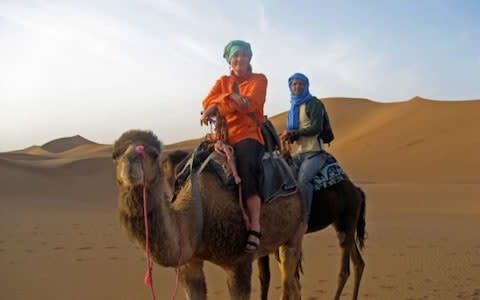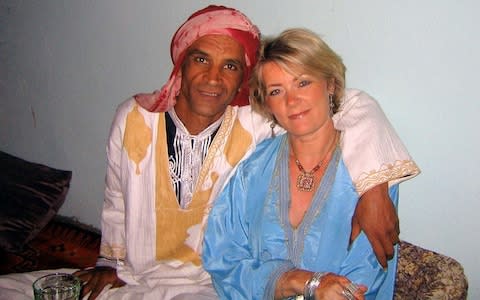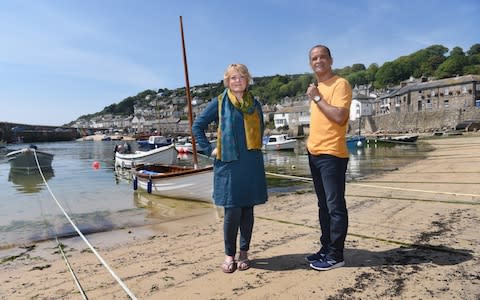I'd sworn off men. Then a novel-writing trip to Morocco led me to love

To meet your future husband – a tall, handsome, mysterious stranger with whom you have no common language - 2,000 miles from home, while in danger of your life (and when you have given up on men altogether), sounds like the perfect pitch for a novel.
No doubt had Jane Johnson, a Fiction Publishing Director for HarperCollins, been offered a manuscript based on such a romantic concept in her London office she would have been delighted.
Instead, proving that old adage about truth being stranger than fiction, Johnson found herself at the heart of this plot in reality, when she was researching her first novel. Having travelled to Morocco from Cornwall investigating the story of an ancestor sold into slavery by Barbary pirates in 1625, the last thing Johnson could have predicted would have been for her life to imitate - a little - both art and history.
The next morning, as we shopped in the souk, Abdel appeared like a djiin, a mythical supernatural genie. He placed a Touareg ring on my finger to protect me and said it would keep me safe
Yet, on a rain-sodden climbing trip to Tafraout in the Anti-Atlas Mountains in February 2005, Johnson found the man who could arguably called both the hero of her novel and her future life when she met then 42-year-old restaurateur Abdel Bakrim.
“I’d travelled to Morocco with my rock climbing partner Bruce,” explains Jane, an elegant blonde with watchful blue eyes, “and we were being stymied by unseasonal rain. With a group of other British climbers, we were just mooching about hoping for a break in the weather. We ended up heading into a local restaurant where the door was opened by an extremely imposing-looking man in a turban.
“I turned to Bruce, and said: ‘Ooh! There’s my Berber pirate chief.’ We all found him enchanting; he was an emperor in his own realm, bringing food to the table with a theatrical flourish. I was completely struck by him.”

Johnson, now 56, spoke no Arabic or Berber, and had scant French so “it was very much a matter of eye contact.”
The next clear morning, she and Bruce set out to climb Lion’s Head, a nearby mountain. “There were a lot of waterfalls and impassable ground to get across before we could begin the technical climbing,” she says. As they reached the crux of the climb, the pair came across a new mudslide and realised they were in potential danger.
“The sun sets fast in Morocco, and there was snow on the peaks. We had set off in light clothing for a fast days’ climb not expecting to get caught on the mountain side. It was absolutely freezing; I thought we might die of exposure.”
With no chance of rescue, Johnson decided to call Abdel’s restaurant so she could at least warn the other British climbers they were alive and would seek to get themselves down at first light. Later she found out that Abdel had spent the night pacing up and down on the roof terrace of his building, looking over to the Lion’s Head and worrying.
“I couldn’t sleep either,” she admits, “and I kept thinking about him; he had had this great effect on me. There’s no doubt that the drama heightened our first feelings.”
When the pair did get back to Tafraout the next day, Abdel “threw a big party; there was singing and dancing – a joyful occasion.
The concept of powerful women is enshrined in their culture - British men found me intimidating but Abdel thought of me as a lioness
“And the next morning, as we shopped in the souk, Abdel appeared like a djiin, a mythical supernatural genie. He placed a Touareg ring on my finger to protect me and said it would keep me safe.
“My knees went weak. We exchanged phone numbers, but I left with no expectations. It had just been a magical experience.”
Back in the UK, and working on the novel which would become The 10th Gift, Johnson was surprised when Abdel called to see if she was OK. They began speaking every night, in initially halting French. “It was decorous. I liked that.
“When you date someone from our own culture – you know so much about them at once almost subliminally. But when you are having to conduct a courtship over the phone in a foreign language, you have to ask big simple questions.”
Jane had never been married herself; in her own past, there had been “two or three significant relationships, but before meeting Abdel I had sworn off men and decided they were hopeless. I’d hated playing games in relationships; I appreciated being able to ask honest questions and get honest answers.”

Johnson can’t pinpoint when they stopped talking as friends, and began to converse as potential lovers, but she arranged to return to Tafraout at the end of April. “Within a week, we were having a coffee, and he said, when are we getting married. I can’t explain why it felt so inevitable but it did.”
Her confidence was inspired not just by getting to know Abdel, who she describes as “intelligent, educated, hardworking” but also her growing understanding of Berbers. “The concept of powerful women is enshrined in their culture. They treat women as equal.
“I liked that about him. British men found me intimidating but Abdel thought of me as a lioness.” The couple married that October.
Johnson sold her London flat and tried to resign from Harper Collins. Instead her managing director insisted the job could work with the new planned peripatetic lifestyle, with winters spent in Morocco, and summers in Cornwall. Johnson went on to write four more novels inspired by her husband’s heritage. The latest - Court of Lions - is an historical novel about the Fall of Granada in 1492, with a modern story running through it.
I have never felt like that cliché of a British woman looking for love abroad. I’m far too independent. And as soon as they met Abdel, everyone adored him
How has her own experience of fitting into a Moroccan family been? “It was not a difficult transition. His family are very cosmopolitan and many of them have married Europeans.
“But here in the UK there is such distrust built into our system. We couldn’t get him even a tourist visa to come to the UK to meet my mother. I was furious at the time; she was too old to travel and he had no interest in moving permanently to the UK. He has his business in Tafraout.”
Family and friends weren’t very surprised by her coup de foudre: “Mother was enchanted by the whole idea of him,” she says. “I think in a previous life she would have been an adventuress herself.
“There was some concern among friends that I would vanish from their world or that he might not be what he seemed. But I have never felt like that cliché of a British woman looking for love abroad. I’m far too independent. And as soon as they met Abdel, everyone adored him.”

Both have had to compromise. Children were not an option given their respective ages, for example. “Abdel has found the climate a shock; the English winter is hard for him, and sometimes the summer too.”
But looking through her husband’s eyes has been revelatory for Johnson too: “I remember going around a supermarket in Penzance, and I had to stop him opening packets of fruit. ‘How do you know if it is any good?’ he asked.”
Abdel’s culture is very modest so he was also taken aback to come across a nudist beach in Cornwall. “Men still keep their shorts on in the hammam.”
In Tafraout, Johnson has had to deal with language barriers. “Berber is complex to learn so I have some stock phrases, but holding an actual conversation is difficult.
I live a much simpler life in Morocco; it’s a time-rich culture. It has taken me back to a place we all need to get to
“But families share the space on the roof terraces, and I can laugh with the other women about abstract things. Once, I was really struck, when I was sitting on the terrace, at my laptop working on a contract with an agent in New York while an old lady sitting near to me was threshing wheat by hand. It was as if we were arcing across centuries.”
She adds: “I live a much simpler life in Morocco; it’s a time-rich culture. It has taken me back to a place we all need to get to.
“What I am trying to do with all my fiction is to point out the similarities not the differences between us, the values we hold in common. I hope people will read my books and come away with a different view of the world.”
Court of Lions by Jane Johnson is published by Head of Zeus, £7.99


